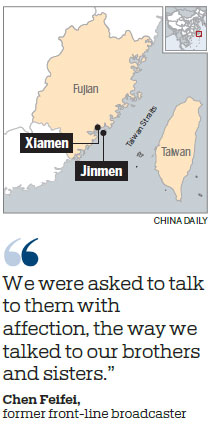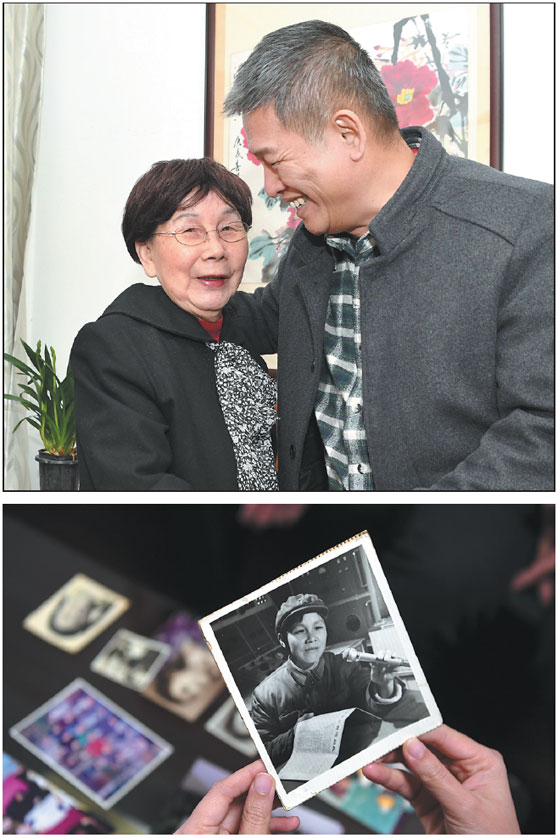Former front-line broadcaster finally meets her audience
Chen Feifei was famous for her radio shows, which were beamed to soldiers based in Taiwan. Zhang Yizhi, Xu Xueyi and Fu Min report for Xinhua.
Memories came flooding back when Chen Feifei met Chen Ching-lung in Xiamen, in the eastern province of Fujian, days before the 40th anniversary of the publication of the Message to Compatriots in Taiwan.
The fraternal greeting to people on the island was issued by the Standing Committee of the National People's Congress in 1979.
Born in Quanzhou, close to Xiamen, Chen Feifei served in the art troupe of the People's Liberation Army before she was recruited as an announcer for one of the front-line radio stations on the coast of Xiamen in 1955.
|
Top: Chen Feifei, a former front-line broadcaster, meets with KMT veteran Chen Ching-lung days before the 40th anniversary of the Message to Compatriots in Taiwan. Above: An old picture shows Chen Feifei broadcasting the message in 1979. Photos by Jiang Kehong / Xinhua |
Her audience consisted of soldiers and followers of the Nationalist Party, or Kuomintang, on Jinmen, a small island affiliated to Taiwan but close to the Chinese mainland.
The KMT fled to Taiwan after losing the civil war (1945-49), beginning a decadeslong military standoff with the mainland. Between the 1950s and late '70s, artillery shells flew across the Taiwan Straits from time to time, making the front-line islands headline news.
In 1953, the two sides began setting up broadcasting stations on the coasts of Xiamen and Jinmen, waging "sonic warfare", and blaring harsh comments at each other as the shells flew.
Chen Feifei, now 84, clearly remembers her days at the broadcasting station.
"A shell hit the station at midnight while I was broadcasting. Fortunately, the building's 2-centimeter-thick walls absorbed the impact. Nobody in the bunker was hurt, but the window was riddled with shrapnel holes, and choking smoke from the blast blew in," she recalled.
As the only female broadcaster at the station, she endured much hardship and braved fires to connect wires frequently downed by KMT shells. For many years, she had to risk her life rushing downhill to use a makeshift toilet.
"In the art troupe, I had a joyous and carefree time, singing and dancing all day long with other girls. I received applause. But at the station, I heard nothing but the sound of myself and loud explosions," she said.
Life on the other side, in Jinmen, wasn't easy either.
Chen Ching-lung's father Chen Chao-yi served on the island.
"When my father was sent to Jinmen in 1958, my family was shrouded in grief because there was little hope of a safe return, given the bitter conflict," Chen Ching-lung said.
He recalled how KMT soldiers had to shelter in damp caves on Jinmen all day long, and sometimes they starved for days when supplies from Taiwan were delayed.
While her station urged KMT soldiers to defect, Chen Feifei said they later started to broadcast letters home, which became a favorite program for KMT soldiers on the mainland. Stricken with homesickness, many KMT soldiers, especially those from the mainland, swam across the narrowest part of the Taiwan Straits to Xiamen. Among them was Justin Yifu Lin, who would later become chief economist of the World Bank.
The turning point came on Jan 1, 1979, when the Message to Compatriots in Taiwan was issued, calling for the peaceful reunification of the mainland and Taiwan.
Guns and canons fell silent, while the tone of front-line broadcasts softened.
"We started to address our listeners as: 'Dear brother KMT soldiers and officers,' instead of 'Brother KMT soldiers and officers,'" said Chen Feifei. "We were asked to talk to them with affection, the way we talked to our brothers and sisters."
Chen Ching-lung was conscripted and sent to Jinmen in 1986. For him, the programs broadcast from Xiamen were just like casual chats with friends.
"They spoke of the attractions on the mainland, reminded us to wrap up warm when it got cold and even told us to eat traditional spring rolls, just like Fujian residents did during festivals," the KMT veteran said.
Unlike the danger of the intense shellfire his father had endured decades before, Chen Ching-lung and other soldiers on the island drilled every day, preparing for an attack that never came.

In 1987, Chen Feifei retired after 32 years of service at the broadcasting station. In the same year a travel ban was lifted, which allowed Taiwan residents to visit their hometowns and families on the mainland.
Two years later, Chen Ching-lung visited the mainland.
"I became very emotional when I saw the Yangtze River, which only existed in textbooks (for me) before then," the 54-year-old said.
In April 1991, the mainland stopped the front-line broadcasts, and Taiwan followed suit.
Broadcasting stations on both sides are now popular tourist attractions. In Xiamen, visitors pose in front of a horn that is believed to be the world's largest military speaker. In Jinmen, the old propaganda is still played today to entertain tourists, but at a much lower volume.
In 2001, passenger, trade and postal links were restored between Jinmen and Xiamen. Seven years later, direct air, sea and postal links were launched between the mainland and Taiwan.
In August, a water pipeline connecting Fujian to Jinmen went into operation, delivering fresh supplies from the mainland to meet the demand on the island.
Xiamen, once the front line of tension, now accommodates more than 120,000 people from Taiwan.
Chen Ching-lung, who settled in Xiamen and ran a hostel in the east of the city, said he had always dreamed of meeting Chen Feifei.
"I had heard her voice for years but never had a chance to know what she was like," he added.
The one-time foes, despite their shared family name, finally met at Chen Feifei's home in Xiamen.
Sharing a pot of oolong tea, the two recalled the songs of Teresa Teng, one of the most successful singers from Taiwan, whose popularity was at its peak throughout the 1970s and '80s, and later reached the other side of the Straits.
Teng's love-themed folk songs and ballads were often played by broadcasting stations on Jinmen. But her songs, like many other Western tunes, were initially considered bourgeois and decadent on the mainland and were not allowed to be broadcast publicly.
"Her singing was so soft and sweet, and many of us liked listening to her, too," Chen Feifei told her new friend.
(China Daily 01/23/2019 page5)



















